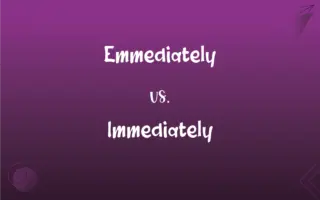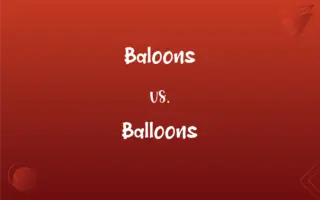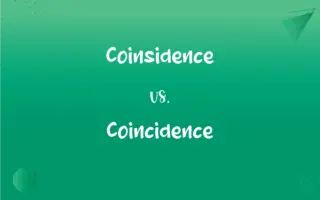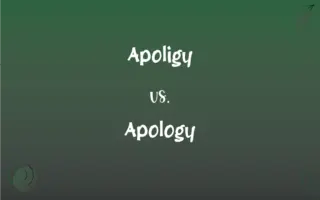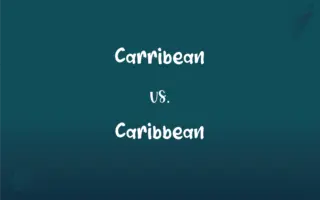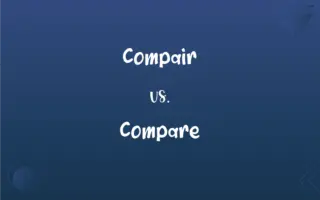Bouyant vs. Buoyant: Mastering the Correct Spelling
Edited by Aimie Carlson || By Janet White || Updated on March 11, 2024
"Bouyant" is a misspelling. The correct spelling is "buoyant," which means able to float or rise in fluid due to lightness.

Which is correct: Bouyant or Buoyant
How to spell Buoyant?

Bouyant is Incorrect

Buoyant is Correct
ADVERTISEMENT
Key Differences
Think of "buoy" and then add "-ant."
Visualize something being "buoyed up" on water when thinking of "buoyant."
Remember "buoy" as the root, like a floating device in the water.
Associate "buoyant" with a buoy floating in the ocean.
Pronounce it as "BOY-ant," focusing on the "BOY" sound first.
ADVERTISEMENT
Correct usage of Buoyant
The economy showed signs of bouyant growth in the first quarter.
The economy showed signs of buoyant growth in the first quarter.
His bouyant personality makes him popular at parties.
His buoyant personality makes him popular at parties.
She remained bouyant despite the challenges she faced.
She remained buoyant despite the challenges she faced.
The boat was not bouyant enough to stay afloat.
The boat was not buoyant enough to stay afloat.
Buoyant spirits are often seen at festive celebrations.
Buoyant Definitions
It can denote resilience or ability to bounce back.
His buoyant personality helped him face challenges.
Buoyant refers to the ability to float in water or air.
The rubber duck is buoyant in the bathtub.
Buoyant means tending to increase or remain at a high level, typically economically.
The market remained buoyant despite the bad news.
It can describe a cheerful, optimistic attitude.
Her buoyant spirit lifted the room's mood.
Having or marked by buoyancy
A buoyant balloon.
Buoyant spirits.
Lighthearted; gay
In a buoyant mood.
Having buoyancy; able to float.
(figuratively) Lighthearted and lively.
I’m in a buoyant mood.
Involving or engaged in much successful trade or activity.
Having the quality of rising or floating in a fluid; tending to rise or float; as, iron is buoyant in mercury.
Bearing up, as a fluid; sustaining another body by being specifically heavier.
The water under me was buoyant.
Light-hearted; vivacious; cheerful; as, a buoyant disposition; buoyant spirits.
Tending to float on a liquid or rise in air or gas;
Buoyant balloons
Buoyant balsawood boats
A floaty scarf
Characterized by liveliness and light-heartedness;
Buoyant spirits
His quick wit and chirpy humor
Looking bright and well and chirpy
A perky little widow in her 70s
Buoyant also refers to the upward force exerted by fluid.
The buoyant force keeps ships afloat.
Buoyant Sentences
She has a buoyant attitude that lifts everyone's spirits.
The rescue boat was buoyant enough to carry all the survivors.
The buoyant foam kept the swimmer afloat.
The buoyant market has investors feeling optimistic.
In a buoyant economy, businesses expand and hire more employees.
Children's life jackets are designed to be extra buoyant for safety.
The crowd's buoyant cheers motivated the team.
After the rain, the buoyant flowers perked up in the garden.
The buoyant melody of the song had everyone tapping their feet.
He used buoyant materials to build his model boat.
Her buoyant optimism is contagious among her friends.
A buoyant demand for renewable energy is driving innovation.
With a buoyant step, she approached the stage to receive her award.
The buoyant fabric ensures the safety device remains on the water's surface.
Buoyant exercise balls are used in fitness classes to improve balance.
Their buoyant laughter filled the room, spreading joy.
His buoyant disposition made him a favorite among colleagues.
Buoyant air currents allow birds to glide effortlessly.
The teacher's buoyant mood made the classroom a positive environment.
The buoyant economy prompted an increase in consumer spending.
The buoyant raft drifted lazily down the river.
The buoyant dancer seemed to float across the stage.
A buoyant breeze lifted the kites high into the sky.
Buoyant sales figures bolstered the company's year-end profits.
The buoyant balloons bobbed in the air, adding to the festive atmosphere.
FAQs
What is the root word of Buoyant?
The root word is "buoy."
Why is it called Buoyant?
Derived from the word "buoy," indicating its ability to keep things afloat.
What is the pronunciation of Buoyant?
/ˈbɔɪ.ənt/
What is the verb form of Buoyant?
The related verb is "buoy."
What is the plural form of Buoyant?
"Buoyant" does not have a plural form.
Which vowel is used before Buoyant?
The article "a" or "the" can be used before "buoyant," depending on context.
Which preposition is used with Buoyant?
"Of" as in "buoyant of spirit."
Is Buoyant a negative or positive word?
Generally positive, but context-specific.
What is the singular form of Buoyant?
"Buoyant" is an adjective and does not have a singular or plural form.
Is Buoyant an adverb?
No.
How do we divide Buoyant into syllables?
Buoy-ant.
What is a stressed syllable in Buoyant?
The first syllable, "buoy."
What is the opposite of Buoyant?
Sinking or heavy.
What is the third form of Buoyant?
Not applicable.
Which conjunction is used with Buoyant?
Any conjunction can be used, depending on the sentence.
Is Buoyant a noun or adjective?
It's an adjective.
Is Buoyant a vowel or consonant?
"Buoyant" is a word that contains both vowels and consonants.
Is Buoyant a countable noun?
No, it's an adjective.
What part of speech is Buoyant?
Adjective.
What is another term for Buoyant?
Floatable.
Which determiner is used with Buoyant?
"This" or "that" can be used, depending on context.
What is the first form of Buoyant?
Not applicable as "buoyant" is an adjective.
Is Buoyant an abstract noun?
No.
Is Buoyant a collective noun?
No.
Is the Buoyant term a metaphor?
It can be used metaphorically, especially when referring to moods or economies.
Which article is used with Buoyant?
Both "a" and "the" can be used, depending on the context.
Is the word Buoyant imperative?
No.
How many syllables are in Buoyant?
Two syllables.
What is the second form of Buoyant?
Not applicable.
How is Buoyant used in a sentence?
"The child's balloon was so buoyant that it quickly rose into the sky."
About Author
Written by
Janet WhiteJanet White has been an esteemed writer and blogger for Difference Wiki. Holding a Master's degree in Science and Medical Journalism from the prestigious Boston University, she has consistently demonstrated her expertise and passion for her field. When she's not immersed in her work, Janet relishes her time exercising, delving into a good book, and cherishing moments with friends and family.
Edited by
Aimie CarlsonAimie Carlson, holding a master's degree in English literature, is a fervent English language enthusiast. She lends her writing talents to Difference Wiki, a prominent website that specializes in comparisons, offering readers insightful analyses that both captivate and inform.
